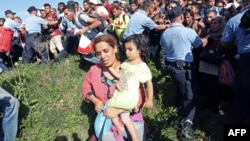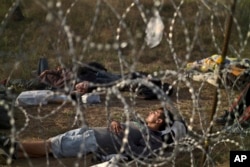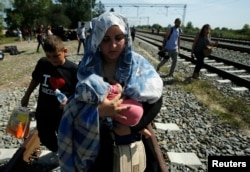Croatian leaders have put the army on alert after crowds of migrants scuffled with police along the border with Serbia as they seek to enter the European Union.
Police did not use force against the migrants as they tried to keep the barriers in place. They finally gave up, and the migrants started running into Croatia.
Croatia became the latest pressure point in the migrant crisis after Hungarian riot police used tear gas and water cannons Wednesday to turn back people at that country's border with Serbia.
Meanwhile, the European Parliament backed a plan to distribute some 120,000 refugees among European Union member countries in an effort to relieve overcrowding in EU border nations that are the first stops for migrants seeking asylum.
The next move is for EU interior ministers to approve the plan, provided they can change the position of Eastern European nations that are against it.
Meeting Thursday in the Slovenian capital, Ljubljana, Austrian Chancellor Werner Faymann and his host, Prime Minister Miro Cerar, called for an urgent EU response to the migrant crisis.
Faymann said after the meeting that this was the time to prove that Europeans “do not want a Europe in which everyone will try to shift their problems to others' shoulders.”
Faymann was to discuss the migrant crisis with his Croatian counterpart, Prime Minister Zoran Milanovic, Thursday in Zagreb. Milanovic has promised to allow the migrants free passage through Croatia.
Croatia
At least 9,200 migrants have entered Croatia since Hungary closed its border, officials said.
Authorities urgently dispatched de-mining experts to the border region to mark minefields left from the Balkan wars of the 1990s.
Croatian Foreign Minister Vesna Pusic said late Wednesday that Croatia was ready for the arrival of thousands of migrants but could not cope with tens of thousands of them.
UN criticism
U.N. Secretary-General Ban Ki-moon denounced Hungary's treatment of migrants Wednesday. He said the migrants "were people fleeing war and persecution" and that "they must be treated with human dignity."
Serbian Prime Minister Aleksandar Vucic also condemned what he said was Hungary's "brutal treatment" of the migrants. Police clashed for hours with the migrants after blocking one of the biggest entry points into the European Union.
Hungary stands firm
But Hungary defended its decision to close the border, saying it was protecting its territory against the influx of migrants looking for better economic opportunities, not fleeing persecution in their homelands.
Hungary said the migrants were trying to push their way past the border fence and presented a danger to the country.
In the first case involving Hungary's tough new anti-migrant laws, a court Wednesday convicted an Iraqi man of illegally crossing the border fence with Serbia the day before, ordered him expelled and banned him from Hungary for a year.
Germany
More migrants sought entry to the European Union elsewhere, walking from Salzburg, Austria, into Germany, or through Lithuania on their way to Scandinavian countries.
While welcoming several hundred thousand refugees, German Chancellor Angela Merkel's Cabinet called for expansion of the country's naval operations in the Mediterranean to block human traffickers from ferrying more migrants from Libya and elsewhere in rickety, overcrowded boats to the shores of Greece and Italy.
If the German parliament approves, up to 950 military personnel could be used in the operation.
More than 430,000 migrants seeking a better life, including refugees from Syria and Iraq, have crossed into Europe this year. Migration watchers say nearly 3,000 have died trying.







